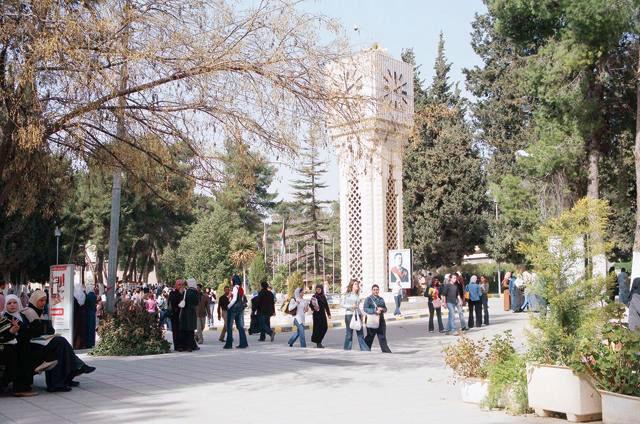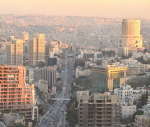You are here
Unemployed PhD holders cry foul as job opportunities seem increasingly far-fetched
By Mohammad Al Raqqad - Feb 05,2019 - Last updated at Feb 06,2019

Students walk in front of the University of Jordan’s bell tower in this undated photo. Jordanian PhD holders say employment seems increasingly hard to find and they charge that many universities do not adhere to hiring regulations (JT file photo)
AMMAN — Falah Ereini, who holds a PhD in law, plans to walk around 180km with his 12 children from Tafileh to Amman on Saturday to stage a sit near the Royal Court and draw attention to his case.
Ereini told The Jordan Times that he has been trying for years to land a job at a state university and has met with every official and lawmaker concerned, but to no avail. Finally, he issued a statement via social media announcing his final attempt.
The school teacher and father of five sons and seven daughters (aged 2-19) is the president of an association that brings together 300 Jordanian PhD holders who have not been able to find jobs at state-run universities. He says that there are 7,000 Jordanians holding a doctorate degree who are not employed, and cries foul at appointment policies in both government-run and private universities.
Official figures indicate that the number of Jordanian graduates from local universities, who earned a doctorate degree from 1997 to 2017, totals 10,074. In 2017 alone, the figure was 935. In the same year, the number of academic staff with PhDs working at Jordanian universities was 8,640, including both Jordanians and non-Jordanians, according to the Department of Statistics.
In the same year, those who graduated from non-Jordanian universities and applied for certificate equivalency at the Ministry and Higher Education’s Recognition and Degree Equivalency Department amounted to 1,815.
The Ministry of Labour does not have specific data on PhD holders’ employment, but estimates that the number of employees with certificates higher than a bachelor’s degree was 57,492 in 2017.
Rules set by the Higher Education Ministry stipulate that at least 80 per cent (and 50 per cent for higher education programmes) of instructors should be Jordanians. Ereini cast doubt on private universities’ compliance with this provision, arguing that these universities prefer foreign professors because they have experience and they “accept salaries that Jordanians would not accept”.
He also questioned all universities’ compliance with a rule that sets the student-instructor ratio, for undergraduate-level courses, at 40-1 for humanities and 35-1 for applied and pure sciences.
“We see that there are classrooms packed with 100-150 students,” he said over the phone.
“They want people graduating from English-speaking countries and they want experience. How can we aggregate experience if we are not given the chance to teach, and why do I need English when I am teaching law,” he said, adding that faculty members at some universities tend to accept overtime hours to make more money, depriving potential applicants of jobs.
“I have sold all the land I used to own in my village to pay for my doctoral studies in Egypt, [worth] more than JD52,000 in total,” Erieni said. “This [also] applies to the thousands who have completed their PhD degrees and have not been employed. Isn’t it a huge waste?”
Related Articles
AMMAN — The board of the Higher Education Accreditation Commission (HEAC) on Wednesday downsized the allowed quota for non-Jordanian instruc
AMMAN — Further efforts are needed to ensure equal opportunities between male and female academics in local private and public universities,
AMMAN — The Civil Service Bureau (CSB) has called on Tawjihi students to give priority to university majors most demanded in the local marke

















